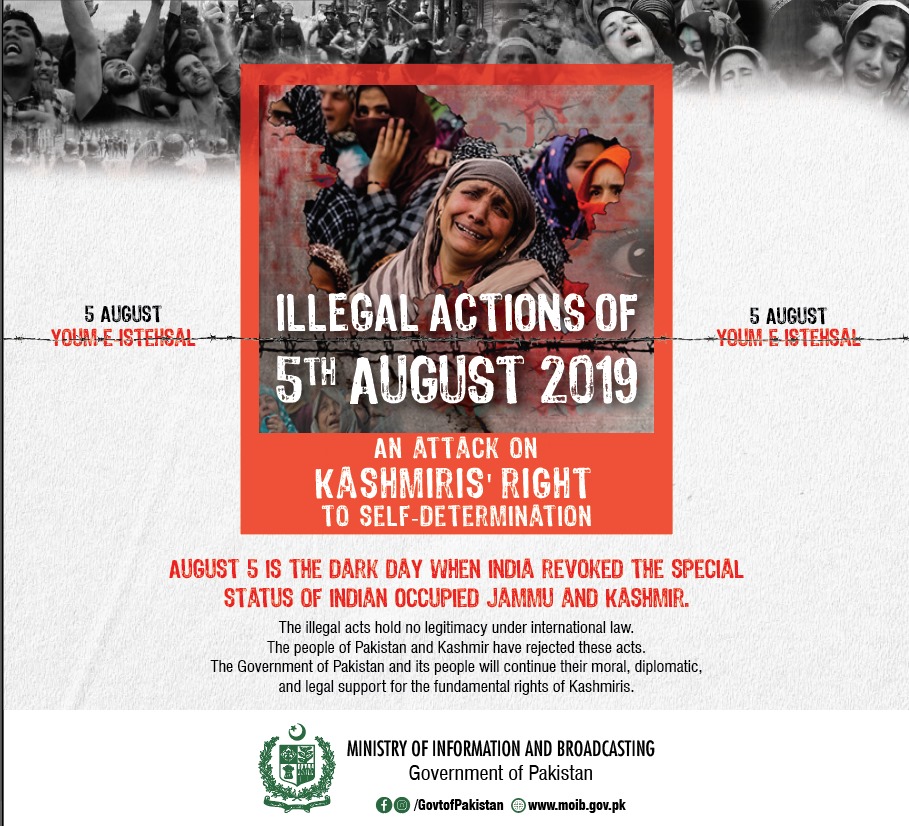August 5 marks the fifth anniversary since the special status accorded to occupied Jammu and Kashmir under Article 370 of the Indian constitution was revoked.
Under the article, Jammu and Kashmir had a separate constitution and autonomy over administration of the region. Kashmiris had their own set of laws under which they were governed and exercised their fundamental rights. One such right was ownership of their land. People from other parts of India could not purchase property in the held valley as this privilege was reserved for permanent residents of the region only. But after the special status was done away with, and amendments were made to the land laws, this was not the case anymore. Now, people from other states could live and buy property in occupied Kashmir.
This whole exercise was in sheer violation of the United Nations Security Council (UNSC) resolution which called for plebiscite to determine the region’s future.
The move not only infuriated inhabitants of the held valley, but also left the pro-India Kashmiri leaders – Mehbooba Mufti and Farooq Abdullah – fuming. Both former chief ministers were put under house arrest.
But, before going ahead with this contentious decision, the Indian government placed the entire region under lock down, arrested thousands of Kashmiris, disrupted all means of communication and deployed tens of thousands of additional troops. Modi was so fearful of the reaction that he turned occupied Kashmir into one big jail.
But, for the Kashmiris, the measures taken were nothing new. They have been living in the world’s highest militarized zone for the last seven decades and bearing the worst form of human rights violation for generations. Countless Kashmiris have embraced martyrdom to this day.
But despite the atrocities and employing every tactic to suppress their just struggle, the Indian occupation forces have failed to subdue the Kashmiris or break their resolve – which is to exercise the right to self-determination.
Ever since the Bharatiya Janata Party (BJP) came to power, the erosion of Indian secularism has set in. The Rashtriya Swayamsevak Sangh (RSS) ideologues believe that India is meant only for Hindus and the other minorities living there are sub-humans.
During the last 10 years or so, the BJP has done everything it could to add to the hardships of the Muslims – whether they were the Kashmiris or those living in other parts of the country.
The controversial Citizenship Amendment Act (CAA), which was also passed in 2019, was one such measure.
The law grants Indian citizenship to those minorities living in Pakistan, Bangladesh and Afghanistan allegedly facing persecution. Followers of every faith except Islam could avail this facility. But when it comes to Muslims, who form the largest minority in India, the state looks the other way. Infact Indian Muslims continue to face injustice, discrimination and violence at the state level in Modi’s Bharat, the likes of which have never been seen before.
BJP’s Prime Minister Narendra Modi has been taking steps that have not only been undermining the minorities but also instigating India’s neighbours in the region.
During his recent visit to Kargil on the anniversary of the Kargil war, which is known as ‘Vijay Diwas’, Modi directed his rhetoric towards Pakistan, desperately trying to up the ante by accusing Islamabad of supporting militancy in occupied Kashmir. He went on to threaten Pakistan, vowing to give a befitting reply.
Similarly, a few days ago, Indian Army Chief Gen Upendra Dwivedi reached the forward areas along the Line of Control (LOC) where he reviewed counter-infiltration and counter-terror operations.
Unfortunately, what the Indian leadership fails to understand is that the Kashmiris’ struggle is indigenous and in reaction to state oppression. Pakistan has always extended moral support to the Kashmiris, which it will continue to do so. There is not a forum where Pakistan does not raise the Kashmir issue – which is the oldest agenda of the United Nations.
The Pakistani missions too have been striving to draw the attention of the international community towards the sufferings of the Kashmiris.
What the world, especially the torch bearers of human rights, need to realize is that India has been waging a war against Kashmiris in total disregard to international laws and committing the worst possible crimes against humanity. It is no different from Israel which is slaughtering innocent Palestinians mercilessly.
The sufferings of the Palestinians and the Kashmiris were so much alike that one would fail to differentiate an image coming out of occupied Kashmir from that of Palestine.
The Kashmir dispute, therefore, needs to be resolved at the earliest. No amount of brutality can stop the Kashmiris from achieving their right. India will have to come to the negotiating table. Threats won’t serve any purpose as both countries are nuclear powers.
If the Modi administration thinks it can hush up the issue by taking steps like revoking Article 370, it is living in a fool’s paradise. It would only ignite the situation and create further uncertainty in the region.
Kashmir dispute has been lingering on for far too long for the world to remain a silent spectator any longer.

